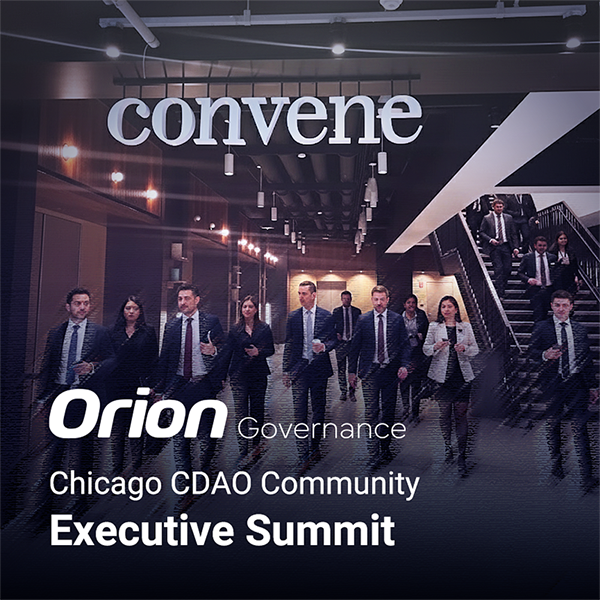The Gartner Chicago CDAO Executive Summit
The Gartner Chicago CDAO Executive Summit, held at the architecturally stunning Convene in the iconic Willis Tower, brought together top data and analytics leaders steering AI initiatives across industries. The day was marked by fruitful idea-sharing and compelling demonstrations of thought leadership.
The central theme was perfectly captured in the keynote, “Beyond Clean Data — Building Trust to Democratize AI,” presented by Wei Manfredi, VP of Global Architecture, Data & Generative AI at McDonald’s. Manfredi outlined the core challenges and immense opportunities for Chief Data and Analytics Officers (CDAOs) in leading digital transformation.
She identified three critical challenges:
- The Trust Challenge: What AI initiatives are your business units delaying due to distrust in the data? How could transparency build that trust?
- The Transparency Challenge: If the board questioned your AI strategy today, could you explain every decision? If not, how will you earn their confidence?
- The Action Challenge: What is your current speed from insight to decision? If you could accelerate this tenfold, what new possibilities would emerge?
To address these, Manfredi introduced a practical Decision-Grade Trust Framework, built on four pillars:
- Confidence Scoring: How reliable is this data for a specific decision?
- Data Lineage: Where did this insight originate?
- Freshness Indicators: How current is this information?
- Decision Boundaries: For which choices is this data appropriate?
Implementing this framework requires a robust data and AI governance platform; manual efforts cannot overcome these challenges. The criteria for such a platform are clear:
- Comprehensive Information Flow Mapping: CDAOs need a platform that automatically builds intra- and inter-system connectivity. This creates a dynamic map of the entire enterprise data journey, which is the prerequisite for determining data reliability and building a foundation of trust.
- Granular and Extensive Data Lineage: An integral part of this map is a lineage solution that spans all technologies—from mainframe environments to modern cloud stacks using Python and Java. It must provide field-level, end-to-end traceability from source and transformation to consumption in AI models.
- Real-Time Insight with Minimal Impact: To power “freshness indicators,” the platform must perform large-scale data profiling, quality analysis, and cleansing in real time. Crucially, this must be achieved with a light footprint, ensuring minimal or no impact on production systems.
- Automated Validation for Accelerated Decisions: The platform must automate the process of determining and validating data accuracy. With continuously updated quality, trust, and confidence scores, CDAOs can set clear decision boundaries. This empowers business teams to effectively “shop” for data tailored to their specific needs, whether for trend analysis, customer insights, or regulatory reporting.
Orion Governance’s Enterprise Information Intelligence Graph (EIIG) is a purpose-built data fabric that integrates these essential capabilities. It unifies real-time data profiling, quality analysis, cleansing, data lineage, cataloging, active metadata management, and data shopping in a single platform.
We are eager to partner with CDAOs to implement the Decision-Grade Trust Framework and accelerate the delivery of trusted, AI-ready data.
About the Author: Niu Bai, Ph.D. is the Head of Global Business Development at Orion Governance, Inc. Connect with Niu on LinkedIn.
recent posts
Orion Governance Announces SOC 2 Type II Certification
Announcing SOC 2 Type II Certification: Orion Governance's Continuing Commitment to Excellence in Security and Trust We are thrilled [...]
A Solution to Solving the Stubborn Data Silo Problem | Evanta NYC 2024 Review
Thank you to Evanta for organizing this CDAO Executive Summit in New York, where leaders in digital transformation shared [...]
How Business Users and Executives Can Benefit from Automated Data Lineage
While technical users—data engineers, data analysts, data scientists, and data stewards– appreciate the value of a data lineage solution, business [...]
Filling Gaps in Comprehensive Enterprise Data and AI Governance
Notes from Databricks Data + AI Summit 2024The annual Databricks Data + AI Summit is always a valuable opportunity for [...]
Orion Governance on the Path to SOC 2 Type II Certification
At Orion Governance, we are committed to the highest standards of data security and integrity. As part of our ongoing [...]
How Metadata Profiling Fuels Data Governance
Unleash the Power of Your Data: How Metadata Profiling Fuels Data Governance and Drives Informed DecisionsData management, governance, and analytics are [...]








